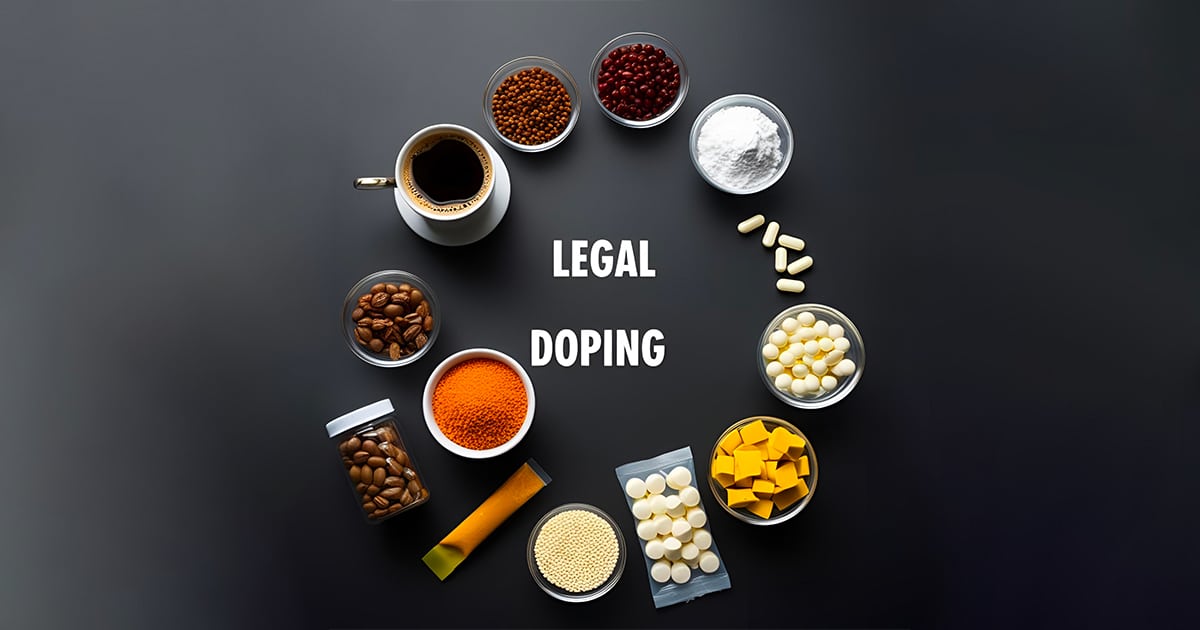“Legal doping”: caffeine, bicarbonate, dietary supplements… how far can you go without breaking the rules?
Knowledge about running is continually evolving. Whether in training, recovery, physical and mental preparation, or nutrition, research on these subjects is increasing. Runners are becoming more informed and interested in the available avenues for progress. Brands follow this trend by offering not only more sophisticated equipment but also a multitude of diverse products. Some of these can surprisingly be found in our own cupboards. This form of “legal doping” aims to enhance performance, optimize recovery, and compensate for nutritional deficits related to intensive sports practice.
“Legal doping” can include substances and foods permitted by anti-doping authorities. It can involve superfoods with beneficial health properties, and therefore for performance, as well as products available in stores, pharmacies, or even running shops. Essential for some athletes, less appealing for others, “legal doping” arouses curiosity and interest.
According to the French Anti-Doping Agency (AFLD), a substance or method is considered doping if it meets at least one of the following three criteria:
- It has the potential to enhance or effectively enhances sports performance;
- It poses a real or potential health risk to the athlete
- It is contrary to the spirit of sport.
Marathons.com offers a non-exhaustive list of legal foods and products to help better understand their attributes on performance and recovery.
| Bicarbonate to limit lactic acid
In recent years, many athletes have been sharing their experiences on social media with baking soda solutions, designed specifically for endurance sports. These products allow users to prepare their own mixture in a suitable container, thanks to kits available on the market.
What’s the benefit of this substance, not appreciated for its taste? It helps “buffer” the onset of lactic acid built up during intense exertion, especially at the end of a race. When the body is pushed to its limits, muscle acidification occurs, making acceleration more challenging and leading to the development of cramps. The use of bicarbonate aims to delay these effects to improve performance.
Unlike regular culinary bicarbonate, these specific formulas are designed to minimize gastric issues. The World Anti-Doping Agency permits the use of bicarbonate, a practice not new in the world of endurance sports, where it has been used for decades.
Fad or true asset? Opinions differ. Some athletes are reluctant to incorporate this type of supplementation into their routine, believing performance should remain “natural,” while others see it as an effective means to enhance their potential. However, this “legal doping” does represent considerable investment.
| Caffeine, a favorite stimulant among athletes
Caffeine was removed from the list of prohibited substances by anti-doping agencies in 2003. Runners and athletes in general highly prize this substance. One of its most cited benefits is its stimulating effect, providing a boost that makes one feel more alert, focused, minimizes fatigue, and makes the exertion seem less demanding. It’s the traditional pre-race or pre-training coffee that makes you feel awake.
Other effects include preventing a drop in blood sugar or prolonging muscle efficiency during effort. However, there are potential side effects. Dehydration due to its diuretic properties is one, along with increased heart rate and sleep disturbances. Excessive consumption can prove more harmful than beneficial.
Brands have well understood this interest from athletes for this substance. Caffeinated gels, pills, and drinks are flooding the running and cycling markets in various forms. The risk: overlooking excessive consumption.
| Beet juice for muscle oxygenation
As surprising as it may seem, beet juice is considered a natural “doping” agent, particularly in endurance sports. Some athletes even undergo courses of the precious dark liquid. It’s an exceptional antioxidant, rich in vitamins A, B, C, iron, calcium, magnesium, potassium, folic acid, and nitrates.
The nitrates in beetroots transform into nitric oxide in the body, which would optimize muscle oxygenation and contraction during exertion by dilating blood vessels. Thus, drinking beet juice might enhance oxygen supply to muscles, boosting strength and endurance while reducing muscle fatigue.
The qualities of beets can accelerate recovery, reduce inflammation and cramps, and act as a natural detoxifier. Besides the sought-after qualities for athletes, beets might also improve memory.
| Turmeric, a powerful anti-inflammatory
Turmeric, often used to spice up dishes, is a superfood. This plant that grows in Asia is a powerful systemic anti-inflammatory, meaning it reduces inflammation throughout the body, regardless of its location.
Turmeric is also rich in antioxidants. Combining it with black pepper or ginger could improve the absorption of curcumin, its active ingredient. This spice also reduces oxidative stress caused by intensive training.
This molecule (also available as a dietary supplement) would be ideal for reducing muscle soreness and thus improving recovery for athletes. Additionally, curcumin strengthens joints, bones, and supports better digestion.
| Dietary supplements to address deficiencies
Dietary supplements, not to be confused with medications, are used to avoid deficiencies due to intensive practice, biological or dietary deficiencies. Iron, magnesium, zinc, creatine, collagen, spirulina, turmeric, omega 3-6, electrolytes, BCAA, amino acids, various vitamins, the list of dietary supplements is long.
Their purpose? To compensate for the loss of carbohydrates, magnesium, minerals, that affect athletes. The goal of these compounds is to stabilize or raise levels of certain indicators that are too low, without exceeding the norms. For example, female athletes are often prone to iron deficiencies. Deficiencies are often the cause of chronic fatigue, poor recovery, leading to injuries or subpar performance.
Their interest can also be to help recover better, to reduce pain (joint, tendon for example), muscle soreness, cramps, and to optimize hydration. While illegal doping illegally boosts an athlete’s capabilities, legal dietary supplements can help avoid nutritional deficiencies caused by a significant training volume.
Above all, it is crucial to conduct a dietary and blood assessment with a doctor to determine if supplementation is necessary and which supplements to choose based on your needs. It’s also essential to turn to French-made supplements, with guaranteed origin, where composition and labeling comply with regulations, to avoid any risk of contamination with doping substances.
✓To verify if a product is doping or not: : www.medicaments.afld.fr



